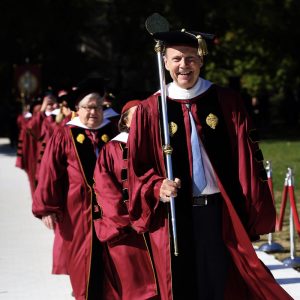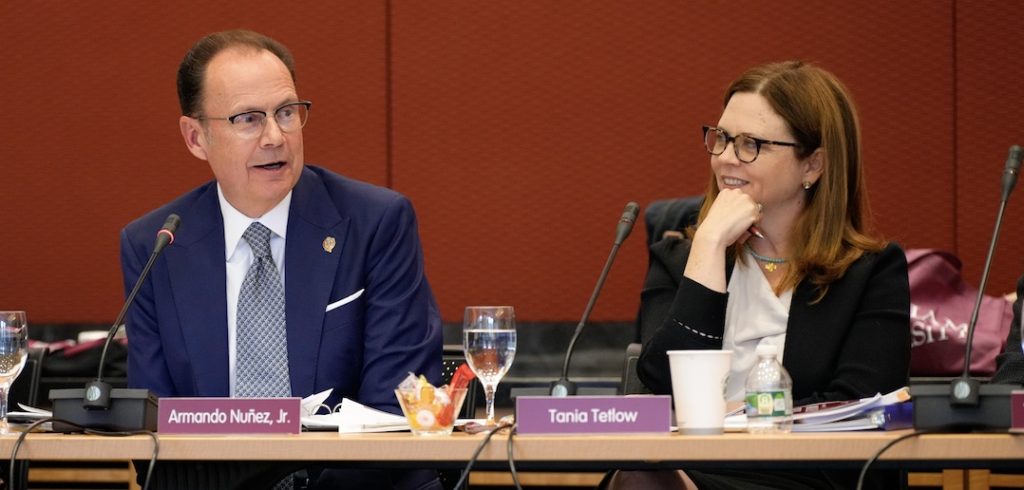In a Q&A, Nuñez talked about the board’s vision for Fordham, including the University’s commitment to global education; its Jesuit identity, and the need to embrace new technologies like AI.
You have led the international divisions of major U.S. media companies, including CBS, where you brought some of the world’s most well-known shows to a global audience. How will you bring your experience in media and communications—and your global perspective—to this role?
My experience has given me unique insights. Corporations historically viewed their businesses through a bifurcated lens: international vs. domestic. With time and evolution, that paradigm has shifted to mostly a global view.
Likewise, I want to help Fordham to continue to grow globally. When I was a student, Fordham was mostly a tri-state area university. Now it is a nationally recognized institution. California, where I live, is our third largest feeder state into Fordham for undergraduates. International students make up roughly 7% of our undergraduates and 11% of the entire Fordham population. In the last few years, we have seen an increase in recruitment from countries like India and Vietnam. We recently held regional alumni receptions in Beijing, Hong Kong, Rome, and Shanghai, and Dean Aksoy announced the relaunch of the Doctor of Professional Studies in Business program with Peking University. There was also a contingent led by President Tetlow at our incredible campus in London this year.
Many opportunities already exist, but we need to continue to recruit and expand—nationally and internationally—and offer more of our students the opportunity to study abroad, seeing firsthand our world’s different governments, cultures, and religions, while broadening their perspective.
You started as chair-elect on the same day that Tania Tetlow became Fordham’s 33rd president. Can you tell us about your shared vision for Fordham?

There’s no question about the great impact that President Tetlow has already had on Fordham. Our shared vision is one of opportunity, while confronting the current challenges facing higher education, like accessibility and affordability.
Fordham is a Jesuit Catholic institution in the greatest city in the world. Thirty-six percent of our undergraduates identify as Catholic, so clearly, concepts of a Jesuit education resonate, irrespective of religious background. It’s who we are and will always be, and what separates us from other educational institutions in New York. We have tremendous opportunities to evolve. And we have an innovative and abundantly gifted president working with our engaged board members, many of whom are themselves first-generation college alums, who will lead us boldly into Fordham’s next chapter.
You are the first Hispanic person to serve in this role. How will this influence your leadership?
We have incredible diversity on our board. The overwhelming majority of trustees are Fordham graduates who came from very humble backgrounds, from across the country and outside the U.S. They were fortunate to be able to go out into the world and succeed, after graduating with a Fordham degree and a Jesuit education. Now they want to give back to Fordham. And at this pivotal moment, with President Tetlow starting her second year in office, we want the best and brightest sitting around that table, engaging with the challenges and opportunities ahead of us.
My participation on the board and being chair of the board reflects that great diversity. I’m extremely proud of my Cuban background and heritage and proud that Fordham has such great diversity, which includes a large percentage of students who are Hispanic. It’s a great honor for me to be the first Hispanic chair—and being asked to serve in this position.
As higher education—and the workplace in general—are facing disruption from AI, can you tell us how your industry faced similar challenges, and how and whether AI had already started to disrupt your work in global communications?
I worked in an industry that probably had more revolutionary changes than any other over the last five years. Those changes were primarily driven by technology, which significantly impacted the way people consumed content and how content was monetized. We transitioned from the old-fashioned way of watching linear television during set times scheduled by companies to the flexibility of watching content at any time. That’s an over-simplistic version of the impact of technology on the media industry, but with that came groundbreaking changes. It was a difficult undertaking, but there was no choice but to embrace it and move on.
That’s been the same issue with all new technologies. There’s a certain level of fear when something new comes along. But you can’t run away from it—and you can’t run away from AI. We have to embrace it, study it, know it, teach it, and figure out its benefits, while trying to protect ourselves from its pitfalls. You embrace it, and you move on.
Any final thoughts?
I could have never imagined in my wildest dreams that this Cuban kid who commuted on the D train from Hell’s Kitchen to Fordham would end up serving on its board for 11 years, and now serve as its chair. It’s an honor to be a voice for the board and to work closely with our president at a key moment for our country and the world where education in general, and Jesuit education in particular, are abundantly needed. I look forward to every opportunity to give back to Fordham, and to thank other donors who have invested in our noble mission.
This interview has been edited and condensed for clarity.

